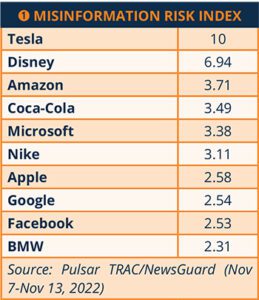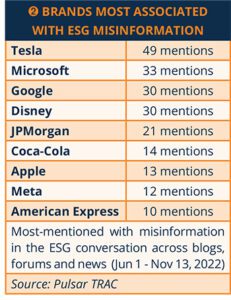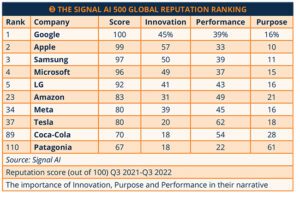
PR pros know misinformation, or unintentionally misleading content, and disinformation, material its creator knows is untrue, can instigate a PR crisis and blemish reputation.
With a survey claiming reputation will overtake margin as a driver of business performance within five years, it is understandable that some executives want reputation measured. Doing that depends on your definition of reputation and what you deem important.
Every vendor (and there are many) says its method of measuring reputation is superior. Can they all be right?
Signal AI claims its proprietary algorithm digests 2 billion data points annually as it ranks 500 companies’ reputations.
Scores are based on: how often a company is mentioned against a topic, how prominently it appears in a story and how positively or negatively it is portrayed.
The top 5 firms in the new Signal AI 500 Global Reputation Ranking are shown in Chart 3. Following those 5 are another 5 firms we picked from the list.
Meanwhile, Pulsar compiles a weekly Misinformation Risk Index, tabulating the frequency and reach of mentions on what it calls “unreliable news and information sites.”
A partner, NewsGuard, ranks media outlets’ reliability, basing ratings on 9 credibility and transparency factors.
In Chart 1, Tesla ranks as the company most associated with misinformation. It also has the dubious honor of leading the list of firms associated with misleading ESG information (Chart 2).



